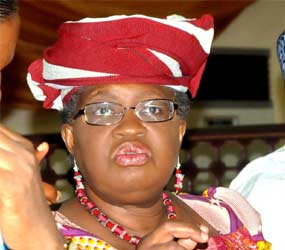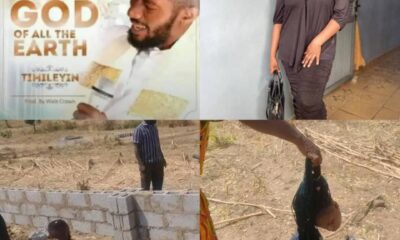Finance
Nigeria lacks institutions, systems, processes to prevent corruption – Okonjo-Iweala

Abuja – Nigeria’s Minister of Finance and co-ordinator for the economy, Dr Ngozi Okonjo-Iweala, has stated that corruption persisted in the country because Nigeria lacked the institutions, systems and processes to prevent it.
Okonjo-Iweala made this known when she spoke on the Topic: `Preventing Leakages in the Nigerian Economy` at the Catholic Caritas Foundation Forum in Abuja.
According to her, the absence of the relevant systems and institutions that will help check corruption has created opportunities for people to engage in the act.
“This thing has been with us and we must crack it. This is not something that started in this country today; but it is something that we must crack.
“Fundamentally, we have to ask ourselves, why has this continued to be a problem; I am convinced that it is because we constantly look at the symptoms and not the cause of the disease.
“The cause of the disease is we don’t have in place the institutions, the systems and the processes to block and prevent it in the first place.
“That’s the only difference between us and the people abroad.`
The minister assured that people would be compelled to do the right thing always if the appropriate systems were in place to block and prevent corruption.
She urged youths in the country to ask the relevant questions that would help tackle corruption in the country.
She said: “This is so important now because of technology and I am a total fan of the use of technology and electronic platforms to block the leakages in this country.
“We must use them the way they are being used in other countries.“
Okonjo-Iweala said that the introduction of the Government Integrated Financial Management System (GIFMS) had helped to reduce physical movement of cash to make payments and curb corruption.
She said that the Integrated Personnel Payment System had also helped government to remove ghost workers from the system and save money in the process.
She said, “We have been able to weed out about 62,893 ghost workers till date saving N208.7 billion and we have not finished in the system. That is addressing the root cause.“
The minister said that the names of the persons found to be involved in the act had been sent to the ICPC for further action.
OKonjo-Iweala said that through the electronic wallet system introduced by the Ministry of Agriculture, government had been able to reduce corruption in fertilizer distribution in the country.
According to her, 10.5 million farmers have been registered under the system with more than 6 million being able to access the product personally.
This, she said, had contributed to increased food production.
The minister said that with the creation of the Pension Transmission Administration Department as demanded by law, issues with old pension were being handled systematically
She said that 14 people were presently under trial for various pension scams in the country.
Commenting on the outcome of the forensic Audit on the alleged 20 billion dollars missing oil money, she said the ministry had written to the NNPC asking it to remit the amount as directed by the auditors. (NAN)
– See more at: http://www.vanguardngr.com/2015/02/nigeria-lacks-institutions-systems-processes-prevent-corruption-okonjo-iweala/#sthash.OEEMNHkE.dpuf
Business
Nigeria pays US$4.9 billion on petrol subsidy in 2024- NNPCL
It was however noted by Biztellers.com.ng, that although subsidy is back in effect, the main reason for that is the increasingly weak state of the Naira and the country’s extreme dependence on products importation. Also unlike the previous subsidy era, where several oil marketers were getting free subsidy refunds for unverified product importation, this subsidy era is witnessing only one importer, the NNPCL, which in effect is the sole receiver of government subsidies.
Yemie ADEOYE
INSPITE of the official position of the Nigerian government that the controversial petrol subsidy is gone for good as announced by the President on assumption of office, the state owned Nigerian National Petroleum Corporation Limited, NNPCL has disclosed that petrol subsidy is still fully operational in Nigeria, although, under a different identity.
Umar Ajiya, Chief Financial Officer at the NNPCL, disclosed that it cost the company a staggering N7.8 trillion (US$4.9) to cover this price gap in the first seven months of 2024.
Rather than simply referring to these claims as subsidies, he stated that the company is merely managing the price difference in petrol imports on behalf of the federation, stressing that this should not be misconstrued as a return to subsidy payments.
![]() This revelation has reignited discussions on whether the NNPC is indirectly offering subsidies, a concept typically defined as selling a product below its cost price.
This revelation has reignited discussions on whether the NNPC is indirectly offering subsidies, a concept typically defined as selling a product below its cost price.
Documents reviewed by Biztellers.com.ng showed that the term “subsidy” was used extensively in official correspondence between the NNPCL and the presidency, particularly in reference to the “shortfall.”
Recall that President Bola Tinubu reportedly approved NNPC’s request to utilize the 2023 final dividends due to the federation to offset these costs.
However, during a media briefing on Monday about the company’s 2023 audited financial statements, Ajiya refuted claims that the NNPC is involved in any subsidy scheme.
Ajiya further disclosed that the Nigerian government owes the NNPC N7.8 trillion ($4.9 billion) in subsidy-related debts for the period from January to July 2024.
In furtherance of his clarification to the News Agency of Nigeria (NAN), Ajiya insisted that no subsidy payments have been made to any marketer in the last nine years, citing the NNPC’s role as the sole importer of petrol under supply contracts.
He said, “In the last eight to nine years, NNPC Ltd. has not paid anyone a dime as a subsidy; no kobo has been disbursed by NNPC Ltd. in the name of subsidy. No marketer has received any payment from us for subsidy.”
“What has been happening is that we have been importing PMS, which has been landing at a specific cost price, and the government tells us to sell it at half price. So the difference between the landing price and that half price is a shortfall.
“And the deal is between the Federation and NNPC Ltd., to reconcile, sometimes they give us money, so there is no money exchanging hands with any marketer in the name of subsidy.”
Ajiya remained silent on how much of the $4.9 billion could have been remitted to the federation account if the NNPC had not been covering the “shortfall.”
It was however noted by Biztellers.com.ng, that although subsidy is back in effect, the main reason for that is the increasingly weak state of the Naira and the country’s extreme dependence on products importation. Also unlike the previous subsidy era, where several oil marketers were getting free subsidy refunds for unverified product importation, this subsidy era is witnessing only one importer, the NNPCL, which in effect is the sole receiver of government subsidies.
Banking
CBN Denies Currency Devaluation

The Central Bank of Nigeria (CBN) has refuted claims of devaluing the.
Earlier reports suggested that the CBN had devalued the Naira, lowering its exchange rate from N631 to the dollar, compared to the previous day’s rate of N461.60 at the Importers and Exporters (I&E) window.
However, the Central Bank of Nigeria (CBN) released a statement on Thursday through its Acting Head of Corporate Communications, Dr. Isa Abdulmumin, categorizing the report as false information.
In the statement titled ‘CBN Has Not Devalued The Naira’, he said the attention of the apex bank was drawn to the news report by an Abuja based newspaper edition of June 1, 2023, titled “CB Devalues Naira To 630/51”.
However, the CBN stated categorically that the news report was replete with outright FALSEHOODS and destabilizing innuendos, ‘reflecting potentially willful ignorance of the said medium as to the workings of the Nigerian Foreign Exchange Market.’
“For the avoidance of doubt, the exchange rate at the Investors’ & Exporters (I&E) window traded this morning (June 1, 2023) at N465/USS1 and has been stable around this rate for a while.
“The public is hereby advised to ignore the news report by Daily Trust in its entirety, as it is speculative and calculated at causing panic in the market,” the CBN spokesman added.
He, therefore, advised media practitioners to verify their facts from the Central Bank of Nigeria before publishing in order not to misinform the public.
Banking
BREAKING: CBN Increases Interest Rate By 0.5%

The interest rate in Nigeria has been raised to 18.5 percent, up by 0.5 percent, from 18 percent where it was pegged in March 2023.
The Central Banks of Nigeria’s (CBN) Monetary Policy Committee (MPC) resolved to this effect at its third meeting of 2023 in Abuja, on Wednesday.
Governor, CBN, Godwin Emefiele, made the disclosure in the communiqué of the MPC’s meeting, thereafter.
While engaging the media at the end of the two-day meeting, Emefiele, said the committee voted to keep the asymmetric corridor at +100 and -700 basis points around the MPR.
In the view of the MPC, rising inflation rate is traceable to the high energy cost and challenges around the supply chain, among others, which lie outside the corridors of the CBN.
Emefiele said, “The current trend in price development would continue to be monitored by the bank with greater collaboration with fiscal authority to address the drivers of inflation.”
Biztellers reports that the CBN had effected six consecutive interest rate increases, which has seen the rate move from 11.5 percent in March 2022 to 18.5 percent in May 2023.























